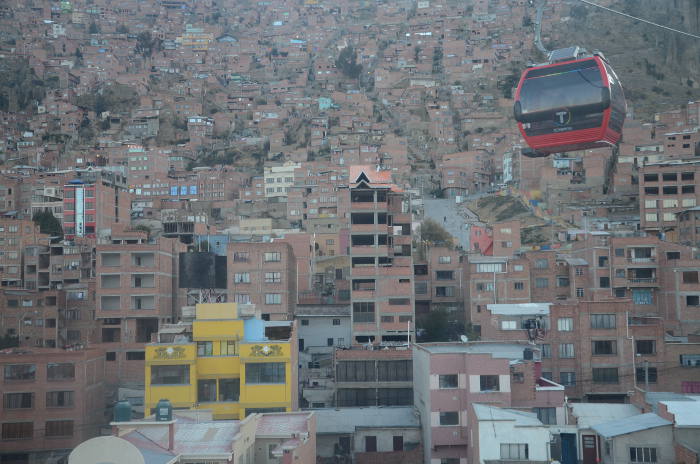-
20 August 2015
Category : Reportage
Linking two worlds
Crónica desde El Alto (Bolivia) acerca del asesoramiento gratuito sobre impuestos que ofrecen estudiantes universitarios de esta ciudad a sus habitantes.
 El “Metro de los cielos” conecta las ciudades de La Paz y El Alto y transporta cada día a 90.000 ciudadanos.
El “Metro de los cielos” conecta las ciudades de La Paz y El Alto y transporta cada día a 90.000 ciudadanos.We take on altitude sickness and cross the air above thousands of dwellings to learn about the Accounting and Tax Support Centre (NAF) at the Public University of El Alto (UPEA) in Bolivia. They say that the modern cable car we’re travelling in links two realities: that of the increasingly prosperous businesspeople, hotel owners and restaurateurs in the south side of the city of La Paz, and that of the town of El Alto, mostly Aymara-speakers who come from rural areas, with high levels of informal labour and scant economic resources. Each day, the so-called “sky metro” transports more than 90,000 citizens, who use it to escape the chaos of city traffic. As the cable car ascends, the difference between these two realities becomes more and more marked.
Now we’re at 4,000 metres. In the background, the imposing Illimani peak, 6,462 metres high, the ceiling of the Real mountain range. El Alto is a city of immigrants, particularly rural farmers from the Bolivian high plain. In barely three decades of existence, it has become the second most populated city in Bolivia, with nearly 850,000 inhabitants.
The “alteños” have fighting spirit, they know very well what it means to start from zero, what it is to struggle against lack of opportunity. El Alto is a sea of small family businesses, micro-enterprises, many of them informal: specifically 72 out of 100, according to the Labour Development and Agricultural Studies Centre. Its relationship with the tax collector has never been easy. It’s not unusual to encounter posters that say: “Tax collectors go home”.
City of El Alto. Illiani Mountain in the background. PHOTO: EUROsociAL.
Bolivia’s National Tax Service (SIN) is aware that coercion cannot be the only weapon against fraud: carrots are needed in addition to sticks. Along with greater incentives and better services, the transformation of the tax culture requires pedagogy. Through tax education, the SIN is seeking a different approach, another viewpoint, greater dialogue. The Accounting and Tax Support Centre at the University of El Alto, supported by EUROsociAL and the SIN, is one such initiative. At the NAF, university students provide free advising on tax and accounting matters to micro-enterprise operators and low-income citizens.
The students at the NAF receive us in one of the classrooms of the university. “The selection process and requirements were exhaustive”, they tell us; “it was hard, but we accepted the challenge and it is paying off”. For some students, the majority from modest circumstances, participating in the NAF represented a great opportunity they didn’t want to pass up. Since its creation three months ago, they have provided assistance to 214 citizens, many of them from the informal sector, who frequently come back after their first visit.
The businesspeople of El Alto feel comfortable with the students. They dedicate time to them, are patient with them, and use plain language. They inspire trust. The maturity, enthusiasm and values of these students are surprising. All of them want to share their experience with us.“One time they wanted to pay us out of gratitude, but we told them that wasn’t possible, that it’s a free service for the community; later they came back with a gift of candy for everyone”, relates one student.
The experience of the NAF has been very useful for them. “It has been a marvellous experience of direct interaction with citizens. We’ve gone deeper into the theory, learning about changes in the tax code, and, most importantly, we’ve put them into practice, which will open a lot of doors in the job market. Plus, we’ve been able to learn the reality of citizens and to explain to them tax issues and their importance to society”, remarks Juan.
Students at the University of El Alto (Bolivia) offer tax advising free of charge to city residents at Accounting and Tax Support Centres (NAFs). PHOTO: EUROsociAL.
“Citizens come in to the NAFs because they’re afraid of the SIN representatives; they see us differently. And, sometimes accounting and legal advisers don’t speak to them using simple words”, he continues. Since business management is mainly a family matter, in most cases there is no accounting control, which limits the effectiveness of the businesses. “Others come in to the NAF because they don’t have the means to hire an adviser, they don’t know about taxes, or because of its proximity to them. In National Taxes, since there are so many people, they can’t assist them in the way that they need, or they leave with unanswered questions. Here they get information and they feel more relaxed in case they have to go back to the SIN”.
These students, just like the cable car, are links that connect two still very separate worlds; they have the advantage of a good understanding of both realities. The dream of Juan, the son of rural businesspeople who came to El Alto when he was just eight, is to work in a public institution and, later, manage his own micro-enterprise. With his experience at the NAF, he’s already taking the first steps towards making this dream a reality.
Article by Borja Díaz Rivillas, Senior Expert on Democratic Governance and Public Finance at EUROsociAL II – FIIAPP.
The views and opinions expressed in this blog are the sole responsibility of the person who write them.






